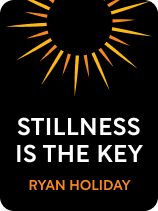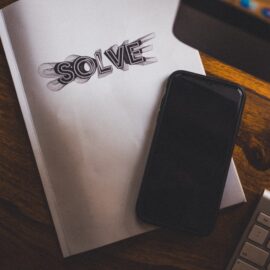

This article is an excerpt from the Shortform book guide to "Stillness Is the Key" by Ryan Holiday. Shortform has the world's best summaries and analyses of books you should be reading.
Like this article? Sign up for a free trial here.
What does it mean to have a strong mind? How do you cultivate mental strength?
A strong mind is a calm and clear mind. According to Ryan Holiday, the author of Stillness Is the Key, the key to developing mental strength lies in cultivating wisdom and humble confidence.
With this in mind, here are some tips on how to cultivate mental strength so you can be free from worries and immune to ignorance.
Strengthen Your Mind
According to Ryan Holiday, cultivating wisdom and humble confidence can help strengthen your mind and keep it still. Wisdom and confidence go hand in hand, because as you become wise you grow more confident in a genuine way, rather than having insecurities manifested as egotism.
Although egotism may look like confidence from the outside, it’s really the opposite. Egotistical and insecure people have very unsettled minds. They’re constantly consumed with their insecurities and perceived flaws and are driven by the need to disguise or compensate for them. These are mental weaknesses, where stillness requires mental strength, which gives you confidence. So, Holiday says it’s essential to cultivate a humble kind of confidence through acquiring wisdom.
| Your Ego Gets in Your Way Holiday’s 2016 book, Ego Is the Enemy, addresses the distinction between egotism and humble confidence more deeply. He argues that ego drives people to focus too much on themselves, which hinders progress toward your life goals in a few ways: – It shifts your focus from the tasks you need to achieve to your own self-image. – You become so concerned with looking good to others that you fear taking risks because you don’t want to be seen as a failure. – You can be so self-centered and prideful that you can’t take feedback or criticism that might help you. – Your ego can blind you to your own faults, keeping yourself from improving in those areas. One key to overcoming your ego is to commit to being a lifelong learner. Always humbly admit that you still have more to learn. |
You Don’t Know What You Don’t Know
Socrates questioned everything, because he recognized how much he didn’t know. Like Socrates, you must be open-minded and humble, and acknowledge your own ignorance, in order to acquire wisdom. Some of the recommendations Holiday gives for increasing your wisdom are:
- Seek out wise teachers and their advice.
- Read books on a variety of topics with an open mind.
- Seek out new experiences that are outside of your comfort zone.
- Learn new skills.
- Contemplate the big philosophical questions in life.
He says you should be patient with yourself because seeking wisdom can be challenging, cause confusion, and even be unpleasant. Learning new things may dissolve your whole worldview, but you have to push through it. Think of it as exercise for your brain. It can feel painful before it feels better, but eventually your mind will become stronger and this will make you more confident.
| Practice Reconsideration Social scientist Adam Grant, in Think Again, agrees with Holiday about the value of being open to new knowledge and beliefs. He says reconsideration—the ability to analyze and question your own beliefs—is an essential life skill that can benefit you in many ways. Some of the benefits of reconsideration include: – Higher quality interaction with others: You can have more productive and engaging conversations with a wider range of people on a wider range of topics and learn more from them. – Greater self-awareness and humility: When you become aware of your own biases and assumptions, it makes you a more self-aware and humble person. – An expanded mind: Being open to new ideas instills a deeper love of learning, which cultivates a sense of openness and adventure. Learning to practice reconsideration requires changing your mindset to think of your current beliefs as “hypotheses” instead of truths. Then, using that framework, you can begin to investigate all the evidence for and against that belief in a neutral way, as if you were doing scientific experimentation. As in all scientific studies, sometimes the hypothesis is proven correct, and sometimes it’s proven false. You must be open to either possibility. |

———End of Preview———
Like what you just read? Read the rest of the world's best book summary and analysis of Ryan Holiday's "Stillness Is the Key" at Shortform.
Here's what you'll find in our full Stillness Is the Key summary:
- Why stillness is not just the absence of motion
- How to cultivate stillness in your mind, body, and soul
- Why you should start ignoring the news






